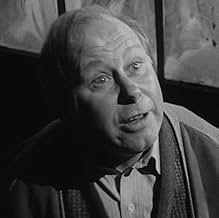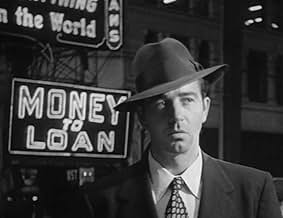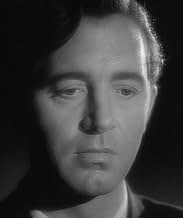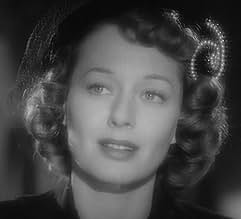IMDb RATING
6.6/10
1.7K
YOUR RATING
War hero recovers from amnesia and is confronted by his criminal past.War hero recovers from amnesia and is confronted by his criminal past.War hero recovers from amnesia and is confronted by his criminal past.
- Awards
- 2 wins total
Hal Baylor
- Coke
- (as Hal Fieberling)
Charles Evans
- Police Capt. Anderson
- (as Charlie Evans)
Chet Brandenburg
- Diner Customer
- (uncredited)
- …
Frank Cady
- Barnes - Man at Bar
- (uncredited)
- Director
- Writers
- All cast & crew
- Production, box office & more at IMDbPro
6.61.7K
1
2
3
4
5
6
7
8
9
10
Featured reviews
Well done...
The plot for "The Crooked Way" is far-fetched but that isn't a problem if the film is well made. It begins with a soldier (John Payne) talking with his doctor. It seems he was gravely injured during the war and took some shrapnel to his skull. He will live and the doctors have done all they can--but Eddie (John Payne) has no memory before the injury. And so, he sets out for what he thinks might be his old home in order to learn who he was. The trouble is, he might not like who he was AND there are some folks there who might just beat his brains in or worse!
This film represented a big departure for John Payne, as up until this film, he was mostly known as a pretty guy--nice and safe. Here, however, he's a man out to destroy...or be destroyed. Because of this movie, he'd soon go on to make other excellent noir films such as "99 River Street" and "Kansas City Confidential".
As far as the quality of the plot goes, it's generally very good--though you do wonder why the now nice guy Payne's character has become is so pig-headed and intent on nearly getting himself killed. But, with a great (and very tough) plot and characters, and especially a very strong ending, it's well worth your time.
By the way, look for Rhys Williams as the police lieutenant. There's no trace at all of his native Welsh accent here! Nice job, Rhys!
This film represented a big departure for John Payne, as up until this film, he was mostly known as a pretty guy--nice and safe. Here, however, he's a man out to destroy...or be destroyed. Because of this movie, he'd soon go on to make other excellent noir films such as "99 River Street" and "Kansas City Confidential".
As far as the quality of the plot goes, it's generally very good--though you do wonder why the now nice guy Payne's character has become is so pig-headed and intent on nearly getting himself killed. But, with a great (and very tough) plot and characters, and especially a very strong ending, it's well worth your time.
By the way, look for Rhys Williams as the police lieutenant. There's no trace at all of his native Welsh accent here! Nice job, Rhys!
Organic Shrapnel In The Head.
The Crooked Way is directed by Robert Florey and adapted to screenplay by Richard H. Landau from the Radio Play "No Blade Too Sharp" by Robert Monroe. It stars John Payne, Sonny Tufts, Ellen Drew, Rhys Williams, Harry Bronson and Hal Baylor. Music is by Louis Forbes and cinematography by John Alton.
World War II veteran Eddie Rice (Payne) is suffering from permanent amnesia after a piece of shrapnel was lodged in his brain. With no recollection of his past life, he heads off to the only place he has a link with, the army registration office in Los Angeles. No sooner does he arrive there he is picked up by the cops, and soon his past life slowly begins to piece together, and it doesn't make for good news at all
The amnesia plot device is served up once again for a film noir make-over, with mixed results. As a story it just about registers as interesting, there's not nearly enough made of the premise, with much of Eddie's memory recollections a bit too convenient for comfortable dramatic purpose. The smart hook is that Eddie, now a genuine nice guy, begins to find out he was something of bad man, very much so, and there are plenty of people displeased with him. There's also some considerable violence dotted throughout, aggression is palpable, while lead cast performances are more than adequate for the material to hand.
However, on a visual level The Crooked Way is on a different planet to the screenplay. John Alton brings all his skills as a film noir cinematographer here, photographing the whole film through a noir kaleidoscope. Characters move through shadows and light, or are bathed in various dark reflections, with the interior sequences brilliantly adding an aura of mental fog. With Florey throwing his bit in the mix as well, with canted angles and isolated lighting of the eyes, it's a top draw noir of the film making style. Their work deserves a better story, but regardless, because of the tech quality and the safe nature of the premise, this has to be a comfortable recommendation to anyone interested in film noir. 7/10
World War II veteran Eddie Rice (Payne) is suffering from permanent amnesia after a piece of shrapnel was lodged in his brain. With no recollection of his past life, he heads off to the only place he has a link with, the army registration office in Los Angeles. No sooner does he arrive there he is picked up by the cops, and soon his past life slowly begins to piece together, and it doesn't make for good news at all
The amnesia plot device is served up once again for a film noir make-over, with mixed results. As a story it just about registers as interesting, there's not nearly enough made of the premise, with much of Eddie's memory recollections a bit too convenient for comfortable dramatic purpose. The smart hook is that Eddie, now a genuine nice guy, begins to find out he was something of bad man, very much so, and there are plenty of people displeased with him. There's also some considerable violence dotted throughout, aggression is palpable, while lead cast performances are more than adequate for the material to hand.
However, on a visual level The Crooked Way is on a different planet to the screenplay. John Alton brings all his skills as a film noir cinematographer here, photographing the whole film through a noir kaleidoscope. Characters move through shadows and light, or are bathed in various dark reflections, with the interior sequences brilliantly adding an aura of mental fog. With Florey throwing his bit in the mix as well, with canted angles and isolated lighting of the eyes, it's a top draw noir of the film making style. Their work deserves a better story, but regardless, because of the tech quality and the safe nature of the premise, this has to be a comfortable recommendation to anyone interested in film noir. 7/10
The Crooked Way (1949)
The story, about a returning war veteran with amnesia discovering his criminal past, is remarkably similar to SOMEWHERE IN THE NIGHT from a few years earlier. Plotwise, it's not nearly as compelling as its predecessor. The amnesia angle really isn't exploited well and what's left is a rather uninteresting gangster story with bland characters. Decent performances from Payne, Tufts and Drew, but only Percy Helton really stands out. However, this has to be one the best-looking noirs out there, thanks once again to the talents of John Alton. Incredible shocks of bright light amidst deep shadows, unusual framing, dramatic angles, gritty locations... the entire picture is simply gorgeous, textbook noir. It's a shame that such impressive visuals aren't attached to a more engaging plot, but it's still a delight to behold.
Solid Amnesic Noir Thriller
This is one of those post-War noir films about a soldier with amnesia. The film is chiefly notable for its excellent expressionist noir cinematography by Austrian émigré John Alton, with some splendid scenes such as two people tensely talking to each other in bold silhouette. Sometimes the stark lighting and dramatic shots are almost too much, as in the beginning when the psychiatrist who has treated John Payne in the Veterans' Hospital tells him as starkly as the lighting of the scene that there are two types of amnesia, organic and psychological, and he has the organic type which cannot be treated because he has shrapnel in his brain. Knowing only that he enlisted in the Army from Los Angeles (he later discovers it was under a false name, which is why the Army cannot discover anything to tell him about his background), Payne is released from hospital and goes back to his origins to see if he can discover anything about who he is. The film moves right along and does not waste time with exposition, so as soon as Payne steps off a train at Union Station, he is recognised by some cops who haven't seen him in five years. Payne then has the shocking realization that he had been a criminal, and he is immediately sucked into dangerous and compromising situations, involving people who want him dead. Ellen Drew is excellent as his former wife who has trouble believing that he is not pretending to have lost his memory, and doesn't want to help him at first. Two of Payne's strong points as an actor were looking bewildered and looking resolute, so he is well cast, as he has to do both in turn. Sonny Tufts is terrifying as a vicious criminal who wants to kill Payne, and one suspects that the film crew must have been scared to death of him. This is a good B thriller of modest pretensions. John Payne was a very nice man with excellent manners and a pleasant personality. I only met him once. My mother and I called on him backstage after he had been in a play. She and he had known each other when growing up in Roanoke and Salem, Virginia. She told me Payne was from what used to be called 'a good family', he was a glamorous young man whom all the girls were chasing, but he got bored with Virginia and decided to become an actor. She had a very high regard for him, and my impression of him was that he was a fine fellow.
If Only the Script Matched the Quality of the Images
Amnesia is not the most original plot gimmick in film. From "Random Harvest" and "Spellbound," from "36 Hours" to "Mirage," from "Memento" to "The Bourne Identity," characters have wrestled with memory loss and struggled to find out who they really were. World War II veteran Eddie Rice has a piece of shrapnel lodged in his brain that has caused his loss of memory, and, once released from the hospital, Eddie heads to Los Angeles, where he hopes to find people who knew him in the past. Handsome John Payne is Eddie, the man in search of his identity in "The Crooked Way," a brilliantly photographed, but otherwise routine film noir. Adapted from a radio play, the derivative plot utilizes voice over to convey Eddie's thoughts and depends on improbable coincidences to bring characters together. Needless to say, Eddie quickly runs into his past, and what he finds plunges him into a murky underworld of gangsters, gunfights, and murder.
With his dark brooding looks, Payne is credible in the undemanding role, and he has solid support from Ellen Drew, the forgotten wife with a new life; Sonny Tufts, a tough gangster boss with a long memory; and Rhys Williams, a policeman who digs into Eddie's criminal past. However, the lazy plot and solid cast are enhanced by John Alton's masterful black-and-white cinematography, which evokes Martin Lewis etchings in its use of light and shadow. Deep black hallways and streets lead to glaring white lights, the slats of Venetian blinds throw bars of shadow across faces, heads are silhouetted while speaking, the lettering on a plate glass window casts words across an office wall, characters are lit from below, white-hot hanging lamps illuminate gaming tables. Alton's outstanding work demands to be studied for its composition, lighting, and focus. Although Alton won an Oscar for his color work on "An American in Paris," his images on any number of film noir and especially this one should have garnered him numerous nominations and wins. Alton's cinematography defines the best in film noir.
While the "Crooked Way" is often cliched and predictable, a solid cast and especially John Alton's images lift the film to essential viewing. John Payne fans should also be pleased, as well as aficionados of amnesia movies. Evidently, loss of memory is more prevalent among characters in Hollywood movies than among the general populace.
With his dark brooding looks, Payne is credible in the undemanding role, and he has solid support from Ellen Drew, the forgotten wife with a new life; Sonny Tufts, a tough gangster boss with a long memory; and Rhys Williams, a policeman who digs into Eddie's criminal past. However, the lazy plot and solid cast are enhanced by John Alton's masterful black-and-white cinematography, which evokes Martin Lewis etchings in its use of light and shadow. Deep black hallways and streets lead to glaring white lights, the slats of Venetian blinds throw bars of shadow across faces, heads are silhouetted while speaking, the lettering on a plate glass window casts words across an office wall, characters are lit from below, white-hot hanging lamps illuminate gaming tables. Alton's outstanding work demands to be studied for its composition, lighting, and focus. Although Alton won an Oscar for his color work on "An American in Paris," his images on any number of film noir and especially this one should have garnered him numerous nominations and wins. Alton's cinematography defines the best in film noir.
While the "Crooked Way" is often cliched and predictable, a solid cast and especially John Alton's images lift the film to essential viewing. John Payne fans should also be pleased, as well as aficionados of amnesia movies. Evidently, loss of memory is more prevalent among characters in Hollywood movies than among the general populace.
Did you know
- TriviaThe La Rue as seen in the film was a famous restaurant at 8361 Sunset Blvd. on the Sunset Strip.
- GoofsThe train depicted as taking Eddie from San Francisco (where Letterman Army Hospital was) to Los Angeles is actually a Pennsylvania Railroad streamlined K4 locomotive, shown on their three-track mainline. This shot has been used in other films.
- Quotes
Eddie Rice: [to Nina Martin] Keep your lights off and the motor running.
- ConnectionsReferences Pitfall (1948)
- How long is The Crooked Way?Powered by Alexa
Details
- Release date
- Country of origin
- Language
- Also known as
- Der Herr der Unterwelt
- Filming locations
- Union Station - 800 N. Alameda Street, Downtown, Los Angeles, California, USA(Eddie Rice's arrival by train in Los Angeles. specifically the main entrance under the distinctive signage.)
- Production company
- See more company credits at IMDbPro
- Runtime
- 1h 30m(90 min)
- Color
- Aspect ratio
- 1.37 : 1
Contribute to this page
Suggest an edit or add missing content








































